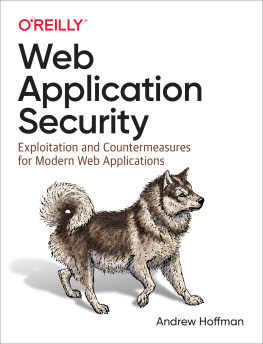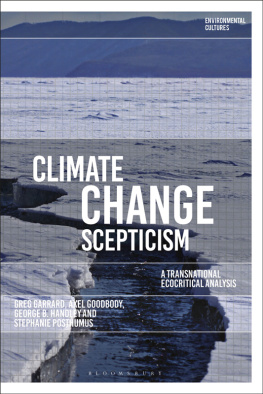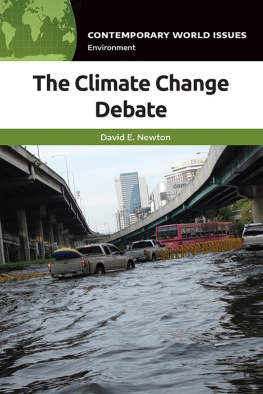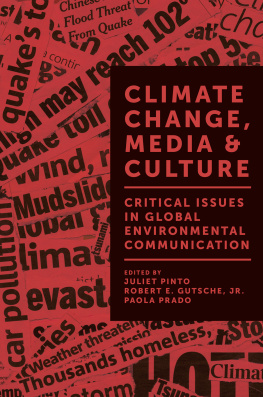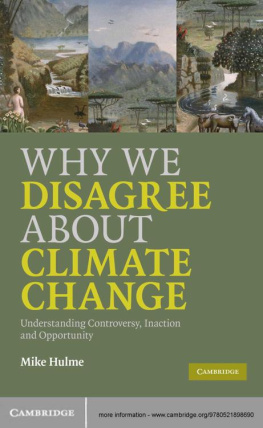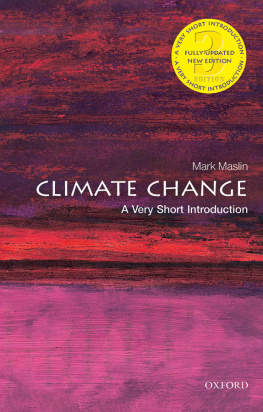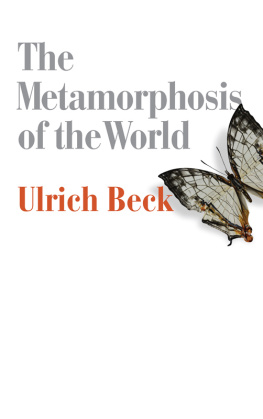Andrew Hoffman - How Culture Shapes the Climate Change Debate
Here you can read online Andrew Hoffman - How Culture Shapes the Climate Change Debate full text of the book (entire story) in english for free. Download pdf and epub, get meaning, cover and reviews about this ebook. year: 2015, publisher: Stanford University Press, genre: Politics. Description of the work, (preface) as well as reviews are available. Best literature library LitArk.com created for fans of good reading and offers a wide selection of genres:
Romance novel
Science fiction
Adventure
Detective
Science
History
Home and family
Prose
Art
Politics
Computer
Non-fiction
Religion
Business
Children
Humor
Choose a favorite category and find really read worthwhile books. Enjoy immersion in the world of imagination, feel the emotions of the characters or learn something new for yourself, make an fascinating discovery.

- Book:How Culture Shapes the Climate Change Debate
- Author:
- Publisher:Stanford University Press
- Genre:
- Year:2015
- Rating:4 / 5
- Favourites:Add to favourites
- Your mark:
- 80
- 1
- 2
- 3
- 4
- 5
How Culture Shapes the Climate Change Debate: summary, description and annotation
We offer to read an annotation, description, summary or preface (depends on what the author of the book "How Culture Shapes the Climate Change Debate" wrote himself). If you haven't found the necessary information about the book — write in the comments, we will try to find it.
How Culture Shapes the Climate Change Debate — read online for free the complete book (whole text) full work
Below is the text of the book, divided by pages. System saving the place of the last page read, allows you to conveniently read the book "How Culture Shapes the Climate Change Debate" online for free, without having to search again every time where you left off. Put a bookmark, and you can go to the page where you finished reading at any time.
Font size:
Interval:
Bookmark:
HOW CULTURE SHAPES THE CLIMATE CHANGE DEBATE
ANDREW J. HOFFMAN
stanford briefs
An Imprint of Stanford University Press
Stanford, California
Stanford University Press
Stanford, California
2015 by the Board of Trustees of the Leland Stanford Junior University.
All rights reserved.
No part of this brief may be reproduced or transmitted in any form or by any means, electronic or mechanical, including photocopying and recording, or in any information storage or retrieval system without the prior written permission of Stanford University Press.
Printed in the United States of America on acid-free, archival-quality paper
Library of Congress Cataloging-in-Publication Data
Hoffman, Andrew J., 1961 author.
How culture shapes the climate change debate / Andrew J. Hoffman.
pages cm
Includes bibliographical references.
ISBN 978-0-8047-9422-0 (pbk. : alk. paper)
1. Climatic changesUnited StatesPublic opinion. 2. ScienceUnited StatesPublic opinion. 3. Political cultureUnited States. 4. Social psychologyUnited States. 5. Public opinionUnited States. I. Title.
QC903.2.U6H64 2015
304.250973dc23
2014042786
ISBN 9-780-8047-9505-0 (electronic)
Typeset by Classic Typography in 10/13 Adobe Garamond
CONTENTS
PREFACE
Academia is a field of brick-makers. This was the theme of an essay written by Bernard K. Forscher for Science magazine in 1963. few social scientists are building an edifice, telling a whole story as it presently exists, and deciding what new pieces of information (bricks) may be necessary to tell the next chapter in the story.
This book is different. My first goal in writing it was to build an edifice from the large and growing body of research in sociology, psychology, and other social sciences about why people accept or reject the science of climate change. From this edifice, I hope other academics will search for missing bricks. And I hope that I can bring the important and underrepresented voice of the social sciences into the national debate on this issue.
As such, the second goal of this book is to reach not just academic scholars but an educated public who can put the insights of this research into use. Again, this is not something that the rules of academia reward scholars and scientists to do. Academics are encouraged to build bricks that are usedor more accurately, citedby other brick-makers. The predominate focus on A-level journals feeds what some have called our theory fetish, in which practical relevance takes a back seat to theoretical rigor and empirical evidence is used to inform theory, not the other way around. Whether this work actually creates real-world change is a question that is rarely, if ever, asked.
This, I believe, is dangerous for both society and higher education. One of the reasons (among many) that the public discourse on climate change has become so confused is that too many academics do not see it as their role to engage in it. I believe they have an obligation to engage in it. If society is to make wise choices, those who create knowledge must find ways to move it beyond the ivory tower. Regardless, I also believe that increased engagement is unavoidable in an emerging educational reality in which a college degree is becoming too expensive, the academic disciplines in which those degrees are conferred are becoming too narrow and specialized, the people who populate those disciplines are being further removed from empirical reality, and external
Whether this book succeeds in its two goals is up to the community of readers. Success will be measured not in citation counts but in the extent to which it changes the way people think about how they think about climate change. The actual metrics for the attainment of that goal are anyones guess. Yet the lack of a precise measurement for impact has always been a problem for the academy, and citation counts have always been a poor proxy. This fact should not discourage those who wish to make an impact. I offer this opening thought as a challenge for my colleagues.
I would like to thank Margo Beth Fleming, Senior Editor at Stanford University Press, for her steady encouragement and guidance on this book; Bob Perkowitz and Max Boykoff for their very generous and thoughtful reviews of an earlier draft; and Mary Fritz and Rich Grousset for their help with the early literature review. Thank you all for your help and support.
A CULTURAL SCHISM
In January 2014, the Eastern and Southern United States were plunged into extraordinarily frigid temperatures that stranded air travelers, stressed power grids, closed schools, and killed more than twenty people. In all, the lives of more than 187 million people (roughly 60% of Americans) were affected by the record-breaking cold. Meteorologists identified the culprit as the Polar Vortex, a large cyclone, first studied in 1853, that circles at the poles of the Earth. And much to their dismay, they watched it become yet another flash point in the rhetorical war over climate change.
On the one side, Rush Limbaugh called the Polar Vortex an invention of the liberal Left to further promote the global warming agenda. Fox News referred to it as the so-called Polar Vortex and aired multiple pundits claiming that global warming could not be true because it was so cold. Under a regular blog called Planet Gore (named for former vice president Al Gore), the National Review mocked alarmists for a tendency to believe that there is absolutely nothing that global warming cant be linked to if you try hard enough. Adding fodder for the war, a Russian research vessel became stranded in the Arctic while studying, among other things, global warming. That led Donald Trump to enter the fray, tweeting, This very expensive global warming [expletive] has got to stop. Our planet is freezing, record low temps, and our [Global Warming] scientists are stuck in ice.
On the other side, a headline in Climate Central pronounced that the Polar Vortex in U.S. May Be Example of Global Warming. A Time magazine headline concurred that Climate Change Might Just Be Driving the Historic Cold Snap, adding that melting Arctic ice is making sudden cold snaps more likelynot less. Common Dreams went even further: Every weather event in the modern world is attributable to climate change. Many also directed attacks on the contrarian viewpoint. The Weather Channel, for example, ran a story, Polar Vortex and Climate Change: Why Rush Limbaugh and Others Are Wrong.
In the midst of this rhetorical war, scientists tried to explain that the issue over climate change is about global temperature increases, not regional weather deviations, and that one weather event does not prove or disprove the science. John Holdren, director of the White House Office of Science and Technology, produced a two-minute video explaining the Polar Vortex, the extreme cold weather, the science of climate change, and the relation among them, concluding that the odds are that we can expect as a result of global warming to see more of this pattern of extreme cold in the mid-latitudes and some extreme warm in the far north.
But these messages became just more ammunition in the rhetorical war. Headlines on the one side read, White House Smacks Down Climate Deniers in New Video, White House Strikes Back at Climate Skeptics over Polar Vortex, and W.H. Science Director Knocks Climate Change Skeptics. Headlines on the other side countered, The White House Gets into the Polar Vortex Climate Change Blame Business, and Global Warming Propaganda Video White House Wasting Tax Payer Money On.
This is what stands for public debate today. Climate change has been transformed into a rhetorical contest more akin to the spec Physical scientists are mystified and frustrated by this state of affairs. But it makes sense to social scientists from disciplines like psychology, sociology, anthropology, political science, ethics, and philosophy, who offer valuable tools, first for understanding why people take such polarized views on controversial issues and then for moving beyond the rancor. This book is an examination of this research work, which it presents in a cohesive narrative, one that describes the climate change debate at its core as cultural.
Next pageFont size:
Interval:
Bookmark:
Similar books «How Culture Shapes the Climate Change Debate»
Look at similar books to How Culture Shapes the Climate Change Debate. We have selected literature similar in name and meaning in the hope of providing readers with more options to find new, interesting, not yet read works.
Discussion, reviews of the book How Culture Shapes the Climate Change Debate and just readers' own opinions. Leave your comments, write what you think about the work, its meaning or the main characters. Specify what exactly you liked and what you didn't like, and why you think so.

